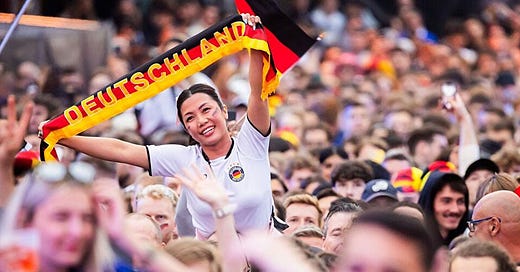Flags & Fear: How Germany's Political Climate Affect Euro 2024 Celebrations?
When Germany hosted the 2006 World Cup, it ignited an unexpected wave of national pride across the country. For many Germans, it was the first time they felt comfortable displaying the national flag, free from the shadows of their dark past. However, as Germany prepares to host the 2024 European Championship, the likelihood of replicating such patriotic fervor appears slim.
✨IWB is an independent project and we need your support to keep running!✨
Support our work and get benefits back:
Stephan Uersfeld, a sports columnist for NTV, highlighted the stark differences between 2006 and 2024: “It’s not going to be like 2006, because we’ve moved on 18 years and there are conflicts everywhere. Conflicts within German society, conflicts within Europe. It hadn’t been the case in 2006.”
Political Climate and National Symbols
In 2006, Germany wasn’t as polarized. The country still refers to that World Cup as a “Sommermärchen,” or summer fairy-tale. It was the first major soccer tournament since reunification, and the economy was recovering from a significant depression. The national team, coached by Jürgen Klinsmann, exceeded expectations, creating an atmosphere of unity and celebration.
Public Sentiment and Far-Right Influence
Axel Lischke, a sound engineer in Berlin, mentioned the impact of the current political climate: “Nobody wants to be confused with the right-wing stuff.” The rise of the far-right party Alternative for Germany (AfD), which frequently uses the German flag in its campaigns, has made many Germans wary of displaying national symbols. This discomfort is echoed by other citizens, like Anne, a 24-year-old Berliner, who finds the increased presence of national flags on the streets unsettling given the recent political shifts.
READ ALSO
The Role of the German Soccer Federation
The German Soccer Federation (DFB) has taken a stance against the far-right, promoting inclusion and tolerance through campaigns against racism and discrimination. However, incidents like the racist abuse faced by former international Mesut Özil in 2018 show the challenges that persist. Özil, who has Turkish roots, was made a scapegoat after Germany's early exit from the World Cup, highlighting the underlying issues of racism and nationalism.
Sociologist Thomas Druyen reflected on the unique circumstances of the 2006 World Cup: “In 2006, the power of football led to a skeptical, not risk-averse, but security-fanatical people really opening their arms and celebrating a big party. For me, as for millions of other people, it was a great moment in my life.”
Current Challenges and Future Prospects
The 2006 event was seen as a transformative moment for Germany, shedding old prejudices and presenting a friendlier, more relaxed national image. However, the current societal context, marked by political polarization and a rise in extremism, makes a repeat of such unifying national pride unlikely. As Druyen noted, “Our society is deeply frustrated. Letting go of such a mood is only possible – if at all – if Germany reaches the final.”
With the Euro 2024 kicking off, it remains to be seen whether the national team can inspire a similar collective celebration. Yet, the backdrop of political and social tensions suggests that the 2006 “Sommermärchen” might remain a unique chapter in Germany's history.
Could Euro 2024 Deliver a Summer Fairy Tale 2.0?
As Euro 2024 approaches, there is much talk in Germany about a possible second "summer fairy tale," reminiscent of the 2006 World Cup. For four weeks in June and July 2006, football dominated life in Germany, with millions gathering to watch matches and celebrate together. The term “Sommermärchen” was popularized by German film director Sönke Wortmann’s documentary, capturing the spirit of unity and pride that permeated the nation.
READ ALSO
Joachim Löw, who was part of the coaching team in 2006, reflected on the documentary's impact: “The power of football led to a skeptical, not risk-averse, but security-fanatical people really opening their arms and celebrating a big party.”
The national team's unexpected success and approachable demeanor played a significant role in fostering this atmosphere. However, the current societal and political landscape poses challenges to replicating such a celebratory mood. With the rise of the far-right AfD and growing societal divisions, many Germans feel uneasy about public displays of national pride.
The Impact of Political Climate
The historian Jens Wagner emphasized the impact of the current political scenario on public sentiment: “The flag of democracy has been appropriated by extremists. We need to reclaim these symbols.”
Despite these challenges, there are parallels between the pre-2006 period and now. Germany has a relatively new national team coach, Julian Nagelsmann, who, like Klinsmann, is willing to break with convention. Young talents like Florian Wirtz and Jamal Musiala bring hope for on-field success, which could potentially unite the nation.
Stefan Nestler, a reporter, noted the potential impact of Euro 2024: “A second soccer summer fairy tale could do Germany as a nation a world of good. It is a historic opportunity to overcome the emotional impasse.”
As Germany prepares to host Euro 2024, the question remains whether the tournament can rekindle a sense of national pride and unity. While the societal conditions are different, the potential for football to bring people together endures. The outcome of Germany's journey in Euro 2024 will reveal if a new “Sommermärchen” is on the horizon.
What do you think? We want to hear your opinion!
Be part of the conversation inside the IWB community. Share your opinions and check out the insights of other women in Berlin.
✨ Support International Women in Berlin✨
Help us empower women in Berlin! With every €1 donation, you say a heartfelt 'thank you' to our independent project dedicated to helping women thrive in Berlin. For €5 or €10, enjoy exclusive perks and access to IWB events. Your contribution is vital for us to continue creating a supportive community. 💌 Donate Now – Let's succeed together in Berlin!








